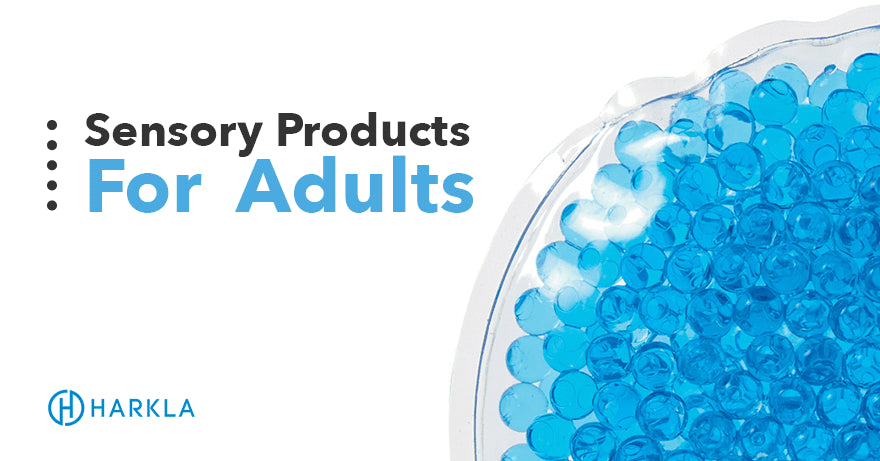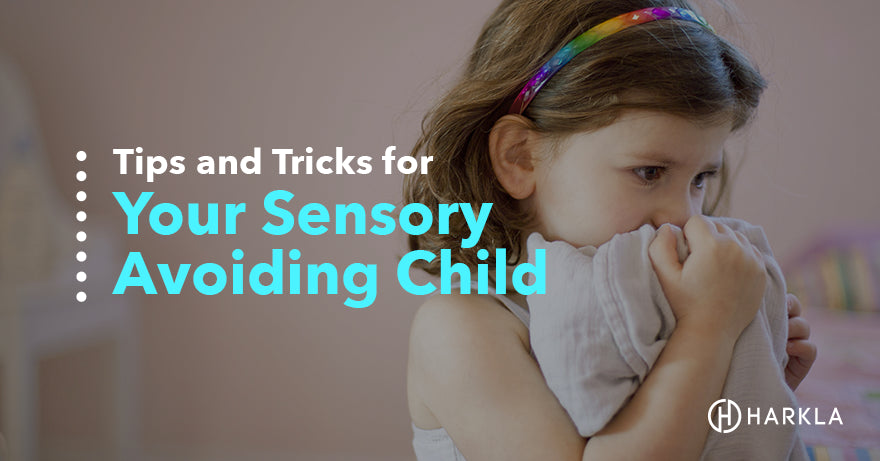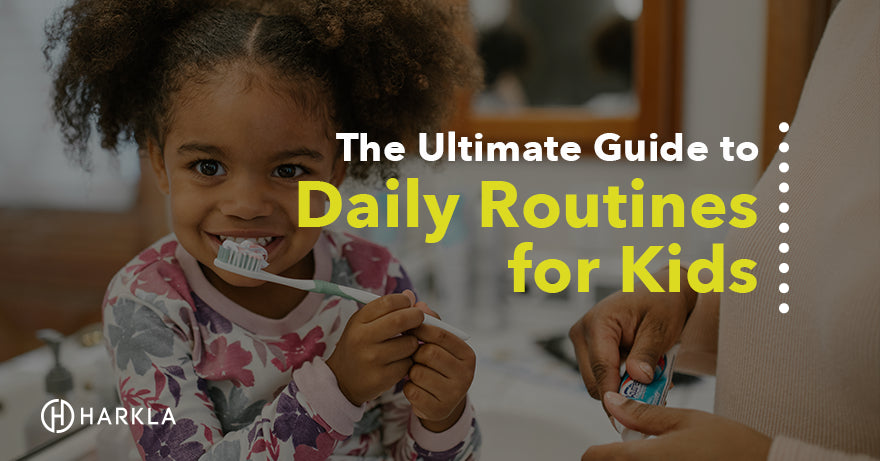Your Cart is Empty

Updated by Molly Shaw Wilson MS OTR/L BCP
How do you deal with stress? When I’m upset, my go-to choice is to grab some ice or minty gum. The action of chewing can be calming to the muscles of the mouth.
In fact, a study in Clinical Practice and Epidemiology in Mental Health discusses that “gum chewing is a popular and convenient way to help relieve stress and improve concentration.”
Everyone chooses different activities as a way to relieve stress and in order to calm and comfort themselves.
I encourage you to think about your own body. What do you choose when you feel tired? How about when you feel upset?
As a pediatric occupational therapist, I understand that our bodies have more than five senses. Proprioceptive input, for example, involves heavy work- pushing, pulling, lifting, and carrying. This can be calming for many of us.
While many of these products are marketed as “autism toys”, even neurotypical adults can benefit from their use. We all have different patterns of sensory integration or sensory processing that makes us unique and can benefit from support when under stress or trying to achieve a state of calm relaxation.
Thinking about what makes you the most comfortable can help you figure out which sensory toy or tool is the right one to choose.
Here is a table of contents to help you navigate our list of the best adult sensory items!
Chances are, adults who struggle to obtain the best and most comforting sensory input have come up with wonderfully creative strategies to meet their needs. I found this helpful checklist for adults from SPD Support.
Understanding your own triggers and stressors helps to know when and how to provide helpful activities. The key is to implement activities before the point of stress.
Our brains are designed to protect us and when we become disorganized and upset, we release chemicals that cause fight, flight, and fright reactions.
Regular participation in activities that both make us feel more comfortable and deliver oxygen to our brains via deep breathing or movement help to regulate and keep in what therapists call the ‘just right’ state of being. It’s when we are in this state that we can interact and function at our best.
Pressure and tight-fitting undergarments sometimes provide compressing that can be calming. Companies such as Under Armour make workout clothing that is snug. Many department stores offer cheaper versions that are equally as comfortable.

Do you feel a sense of relief when you go to the dentist and they lay the heavy lead vest on you for x-rays? That's deep touch pressure in action. It’s amazing how a big bear hug can feel after a long and stressful day, engaging that sense through deep pressure input can help to release serotonin in the body, promoting a sense of calm and relaxation.
Instead of purchasing a lead vest, weighted blankets or lap pad can be used for people of all ages. Try a lap pad first to gauge how your body responds to the weight. If you’re craving more, consider a weighted vest, or one that offers pressure and weight together.
For children, weighted vests should be recommended and monitored by an occupational therapist for appropriate weight and size details, schedule, and efficacy.

Soft surgical brushes are often used to brush the skin in order to provide stimulation to the skin. They can be found in special needs catalogs or on Amazon.
To learn more about sensory brushing, check out our article on it here.
Bean bag chairs are wonderful since they form to the body’s unique shape and size. Many department stores carry them routinely. They offer a sense of deep pressure input, as the body is enveloped by the bean bag, making contacts at many points.
You’re never too old to swing! When done in a linear (back and forth) motion, swinging can be quite calming. This can offer sensory integration at its finest, as movement in a swing engages so many senses working in harmony together.
Have you seen our compression swing? It's comfy and incredibly relaxing, like floating on a cloud. It can hold up to 200 pounds, too!
Heat and cold provide relief when feeling overwhelmed. I suggest using a moist heating pad for sore muscles and use of an ice pack or cooling towel to maintain comfortable body temperature.
Balls of all shapes and sizes can be rolled on the body, used for massage, rolled underneath your feet, over sore muscles and used for fidgeting.
Small items that can be used in one hand are a great way to provide sensory input throughout your day. Often times, these small products are called fidget or stimming toys, but they should be considered more of a "tool" than a "toy".
While a lot of fidget tools are designed for children, a new one we recently came across is called Stimagz, and it's designed specifically for neurodivergent adults.
You can check out Stimagz here on their website.
Sensory Toy Warehouse has a vast collection of fidget items for everyone’s needs. They offer many products designed for adults and children. For those with fine motor goals, look for fidget toys that require dexterity and finger movements, or strength components, like play-doh or putty.
Fidget items can be created from everyday items. Consider keychains, paper clips, rubber and hair bands, putty, stress balls, and erasers are examples.
Oral motor input can come in many shapes and sizes. Chewigem products are safe and durable.
Just because you’re an adult doesn’t mean you outgrow your sound sensitivity. I still do not like any loud and unexpected noise. Often times, noise causes a gut reaction that makes my entire body feel uncomfortable and physically ill.
Here are my suggestions to help:

Noise-canceling headphones provide comfort on the go.
Portable music sources have drastically changed the availability of calming music. Earbuds often don’t provide enough noise protection so try larger headphones. They are fun and colorful!

White noise machines provide options of various sounds for calming and blocking out environmental sounds. I find them comforting and am using one as I write this article! A small fan purchased from your local hardware store can give both cool air and white noise.
Add soft items to your kitchen if the noise of dishes and banging of pots and pans bothers you. Use a tablecloth on the table to dampen sound during mealtime. Place a rubber mat on the bottom of your kitchen sink so dishes do not clank on to the bottom.
Decreasing visual distractions can significantly help some of us to improve concentration. Remember to choose calming colors in your paint and decorating choices. Surround yourself with things which make you feel calm and relaxed.

Adult coloring books can provide relaxation and coloring is fun for both kids and grown-ups. For kids who are working on their fine motor skills, choosing a choice-themed coloring book and a new pack of crayons can be enticing.
Use lower wattage light bulbs. Avoid fluorescent lighting as it can flicker and we are often unaware of the disorganization this can cause to our visual/perceptual system.
Most hardware stores sell light bulbs of all different colors.
Check out our article all about sensory lighting.
Essential oils, candles, lotions, and incense can alter mood and setting. Many of these can be applied to the sensory needs of adults as well.
Sensory toys aren’t just “fun extras”; they can be powerful tools for autistic adults. Many people on the autism spectrum process sensory input differently, which can sometimes lead to stress, overwhelm, or difficulty focusing. Adult Sensory Items provide safe, structured ways to get the input the body craves or to reduce overwhelming sensations.
Here’s why they matter:
Support self-regulation. Weighted blankets, fidgets, or chew tools can help calm the nervous system during moments of stress or overstimulation.
Improve focus. Having access to sensory tools during work, school, or daily routines allows autistic adults to better concentrate and stay engaged. The benefits of fidget toys for adults are especially clear here; they offer discreet movement that channels restlessness into focus.
Reduce anxiety. Comforting textures, movement, or deep pressure can release tension and create a sense of safety.
Encourage independence. By using sensory tools, individuals can take control of their environment and meet their own needs without always relying on outside help.
Normalize sensory needs. Including sensory toys in daily life helps break the stigma, showing that these supports are useful for everyone, not just children.
For adults with autism, sensory toys aren’t about play; they’re about creating balance, reducing stress, and building confidence in everyday life.
Remember that no two people process sensory information in the same way. You have the right to be comfortable and feel safe in your environment.
If you're interested in sensory product ideas for children, check out our top 10 article here for recommendations!
Which of our suggestions have you tried? Let us know if you have any other helpful ideas.
Check Out Our YouTube Videos About the Best Sensory Strategies for Teens, Adults and Parents
Resources
Sasaki-Otomaru, A., Sakuma, Y., Mochizuki, Y., Ishida, S., Kanoya, Y., & Sato, C. (2011). Effect of Regular Gum Chewing on Levels of Anxiety, Mood, and Fatigue in Healthy Young Adults. Clinical Practice and Epidemiology in Mental Health : CP & EMH, 7, 133–139. http://doi.org/10.2174/1745017901107010133
As someone who has faced anxiety issues in the past, I can truly appreciate the value of sensory products for adults. This comprehensive list of sensory items offers a variety of ways to find comfort and relaxation in the midst of stress. I’d like to recommend the “LoveHugs weighted teddy” as an excellent addition to this selection. With its unique weight distribution, the weighted teddy provides a soothing and calming experience, just like a warm hug during anxious moments. It’s a fantastic tool that can help adults find comfort and relief in times of stress and overwhelm. Thank you for sharing this insightful article!
Thank you for this article! I’m an autistic adult, and it’s so nice to see acknowledgement that not only children have these needs. Since I found out I’m autistic, I started sleeping under a heavy weighted blanket. I also color regularly and have a rocking chair. It’s amazing how much these things help.
Thank you for making this. I am a 20 year old woman with ADHD and I have some fairly extreme issues with anxiety and sensory processing. I also have a tendency to pick at my hair and skin as a way to cope. I’ve been looking at fidget toys to help with the compulsive picking and soft clothing because fabrics and tags are distracting.
But most of these products are targeted towards children. The bright colors and noisey toys can be embarrassing in a college setting, so I’m happy to see that someone out there realized that sensory processing is not only a struggle for children.
I am searching for a playground for a 17 year old autistic girl. She has been asking for a new playground for almost a year. She does not communicate well and when she does put something like that together I want her to know she is heard. I have been searching for ideas and can only find a swing for an adult. She is about 5 ft 10in and close to 200 lbs. I want to make sure she is safe. Please if you have any ideas pl are email me !! I don’t know if this is the right forum but it’s the closest thing I have been able to find. Thank you in advance
Hi Rebekah,
Thank you for your feedback! We’re really glad the article has been helpful to you!
Take care,
Nicole
Harkla Happiness Ninja
Hey Mark,
That makes sense. I could see when people are sensitive to smells that it would be more bothersome than helpful. However, some essential oils are often so subtle, and for those who don’t like smells, they may actually help. Thanks for your feedback. We love to hear from our readers!
All the best,
Nicole
Harkla Happiness Ninja
I am a graduate of Dr. Peter Levine’s Somatic Experiencing training. I am also an associate MFT/ PCC and I absolutely loved your article!!!!
I have found numerous articles addressing children but very few for adults.
Thank you so much! I am very excited to implement your suggestions!!!!!
You mentioning fragrances to add (Essential oils, candles, lotions, and incense. Increasingly I know people including myself where the absents of fragrance is much more comfortable. i.e. chemical sensitivity.
I will compare the prevalence of fragrance to a lot of sound “clatter” and cannot stand it.
Comments will be approved before showing up.



SHORNA
September 26, 2023
Hello, I love all the suggestions above as I can see how they can be helpful in many situations. What do you suggest for my autistic 26 year old son who lives with me but cannot stand the sound of my voice? I am his primary caregiver but every time I try to communicate verbally with him, he screams that my voice squeaks in his ears. I am desperate for a solution.